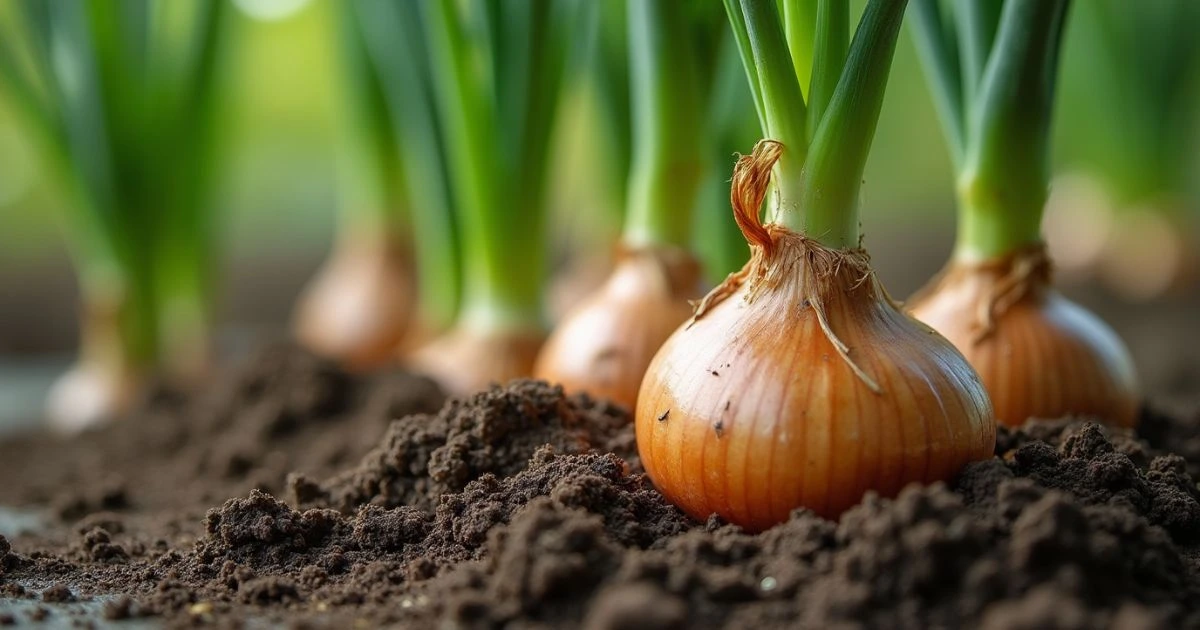Imagine a garden where plants work in harmony, each one supporting the other, creating a balanced, productive environment. Onion companion plants help make this dream a reality, supporting onion growth, enhancing garden health, and keeping unwanted pests away. Whether you’re a novice gardener or a seasoned enthusiast, knowing the best companion plants for onions can transform your gardening experience and make it easier to cultivate healthy, abundant produce.
Let’s dive into the best onion companion plants and how you can make the most of these partnerships in your own garden.
Table of Contents
Why Companion Planting Works with Onions
Companion planting is a time-honored gardening technique in which different plants are grown together to mutually benefit each other. Onions, with their strong aroma, are naturally suited to this approach. They act as natural pest repellents and attract beneficial insects, making them a valuable addition to any garden.
Choosing the best onion companion plants can maximize your garden’s productivity and reduce the need for pesticides. Companion planting doesn’t just help your onions grow better; it also contributes to a more biodiverse and resilient garden. Onion companion plants can help create a balance of nutrients, reduce pest infestations, and maintain soil health, giving you a low-maintenance way to enhance your garden’s ecosystem.
1. Carrots – A Classic Pairing
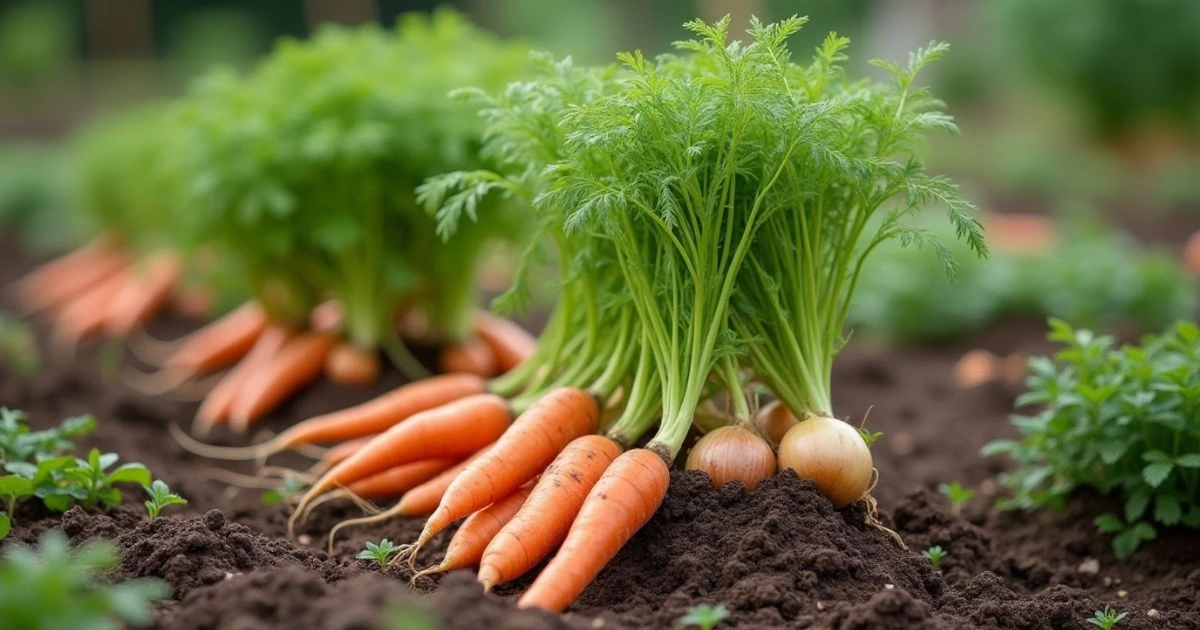
Carrots are one of the best-known companion plants for onions. These two vegetables offer mutual benefits by naturally deterring pests that typically attack the other. The strong smell of onions repels carrot flies, and carrots discourage onion flies, creating a balanced environment that protects both plants.
Benefits of Pairing Onions and Carrots:
- Natural Pest Control: Each plant deters pests that would otherwise target the other.
- Soil Improvement: Carrot roots dig deep into the soil, improving aeration and making it easier for onions to grow.
- Enhanced Flavor: Some gardeners claim that growing carrots with onions enhances the flavor of both vegetables.
Planting Tips: To optimize space, plant carrots and onions in alternating rows or side-by-side. Maintain about 4-6 inches of space between the plants. This setup ensures both crops have enough room to thrive without competing for resources.
Extra Note: Carrots and onions complement each other well in the kitchen, too. Harvest them together for fresh ingredients perfect for soups, salads, and stews.
2. Lettuce – A Beneficial Shade Provider
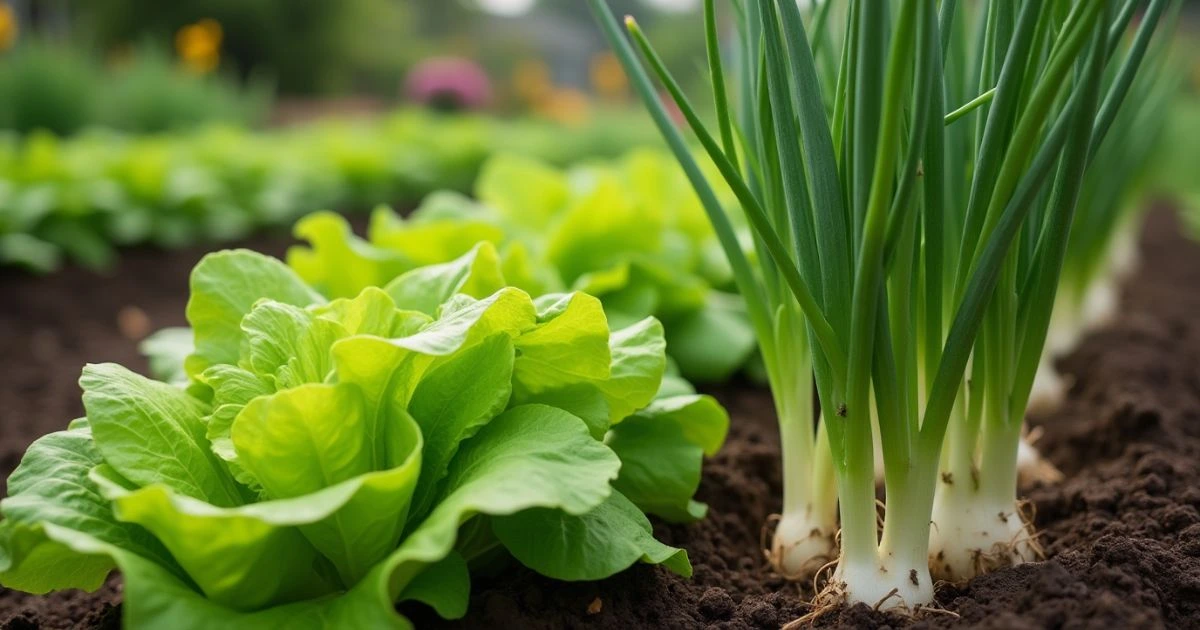
Lettuce offers a wide range of benefits as an onion companion plant. This leafy vegetable acts as ground cover, which helps retain soil moisture and suppress weeds around onion plants. In return, onions protect lettuce from common pests.
Reasons Onions and Lettuce Make a Great Pair:
- Moisture Retention: Lettuce shields the soil, helping retain moisture and keeping the ground cool.
- Weed Suppression: The broad leaves of lettuce help block sunlight, minimizing weed growth.
- Pest Deterrent: Onions’ strong smell naturally discourages pests that might otherwise target lettuce.
Planting Advice: For the best results, plant lettuce near your onions in a raised bed or garden row. Because lettuce grows quickly, it won’t interfere with the longer growth cycle of onions. Keep the plants about 4 inches apart to maximize their space and effectiveness.
3. Beets – Enhancing Soil Health
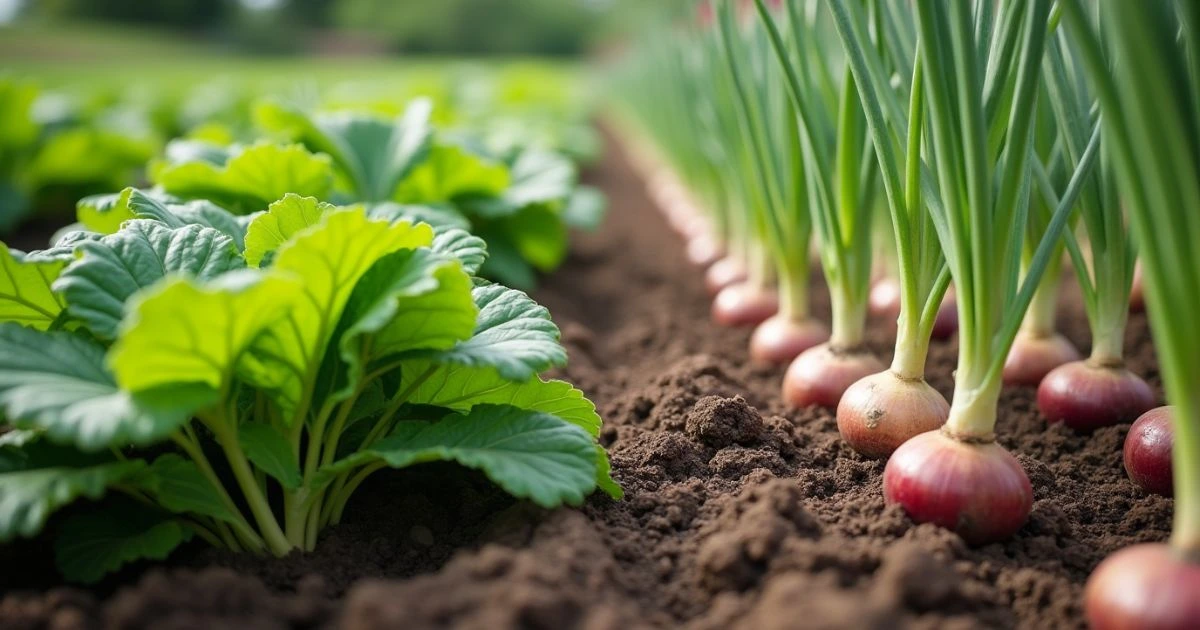
Beets are an excellent companion plant for onions due to their beneficial effect on the soil. As beets grow, their roots penetrate deep into the ground, naturally loosening the soil and creating a healthier environment for onions to expand their bulbs.
Advantages of Pairing Onions and Beets:
- Soil Aeration: Beets help break up compacted soil, which aids onion growth.
- Nutrient Synergy: Both plants have similar nutrient needs, allowing them to grow well together.
- Efficient Use of Space: Beets are low-growing plants, making them ideal for compact garden layouts.
How to Plant: Stagger onions and beets in alternating rows, leaving about 4-6 inches of space between each. This setup allows each plant to access the resources it needs while enhancing the soil.
Additional Gardening Tip: When growing beets and onions together, consider adding a layer of organic mulch. Mulch helps retain soil moisture, controls weeds, and further improves the soil structure.
4. Chamomile – The Insect-Repelling Herb
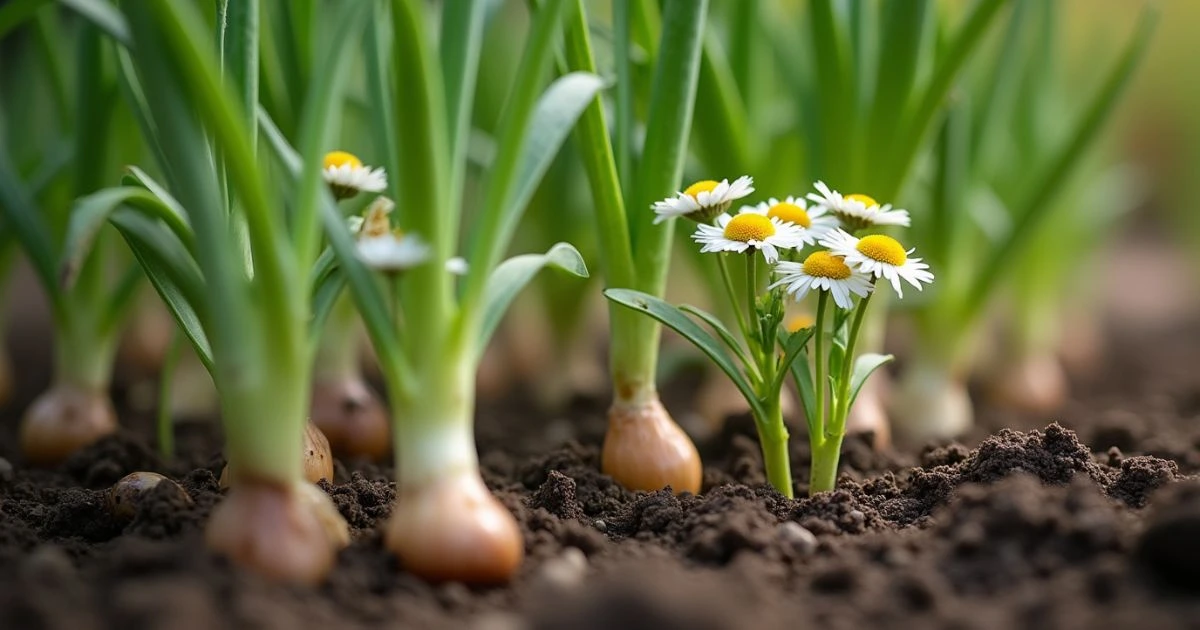
Chamomile is a herb with a long history of supporting other plants, especially onions. It’s known for its insect-repelling properties and even has the added benefit of enhancing the flavor of onions. Chamomile attracts beneficial insects, including ladybugs and hoverflies, which prey on harmful pests, keeping your garden naturally balanced.
Key Benefits of Chamomile as an Onion Companion:
- Pest Control: Chamomile keeps pests like onion flies at bay, reducing damage to your crop.
- Flavor Boost: Some gardeners report improved onion flavor when chamomile is planted nearby.
- Pollinator Attraction: Chamomile attracts pollinators, which helps nearby plants flourish.
Planting Guidelines: Place chamomile near onions with about 8 inches of space between them to allow for growth. Chamomile’s flowers make a lovely addition to any garden and encourage biodiversity.
In the Kitchen: Both chamomile and onions have a wide range of culinary uses. Harvest chamomile flowers for tea, and enjoy the enhanced flavor of onions in your recipes.
5. Spinach – Ground Cover and Nutrient Support
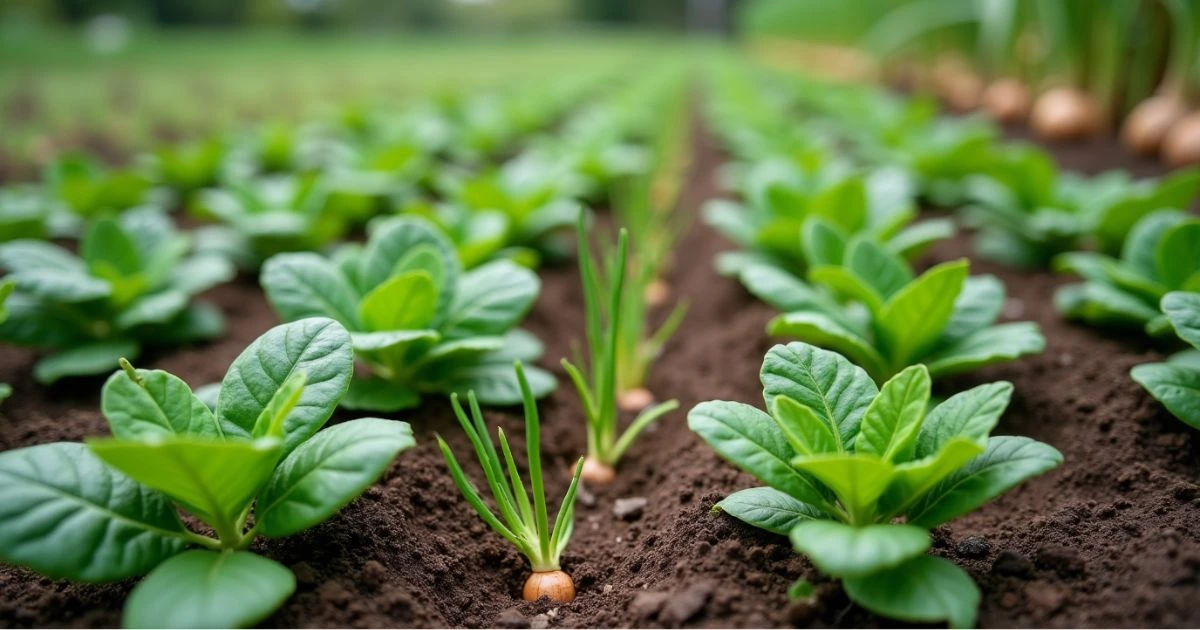
Spinach is another leafy vegetable that complements onions well in the garden. Acting as a natural mulch, spinach keeps the soil temperature stable and reduces evaporation, which is beneficial for onions.
Advantages of Growing Spinach with Onions:
- Soil Temperature Control: Spinach provides natural shade, keeping soil temperatures steady.
- Moisture Conservation: Reduced evaporation means onions need less frequent watering.
- Nutrient Compatibility: Spinach and onions share compatible nutrient requirements, allowing them to grow well together.
Planting Tips: Sow spinach close to onions, maintaining about 3-4 inches of space between them. This companion planting strategy works especially well in early spring and late fall, as spinach thrives in cooler weather.
Harvesting Advice: Harvest spinach leaves as they mature to keep the plant productive. This practice also ensures that spinach won’t overshadow onions as they grow taller.
6. Tomatoes – A Pungent Protector
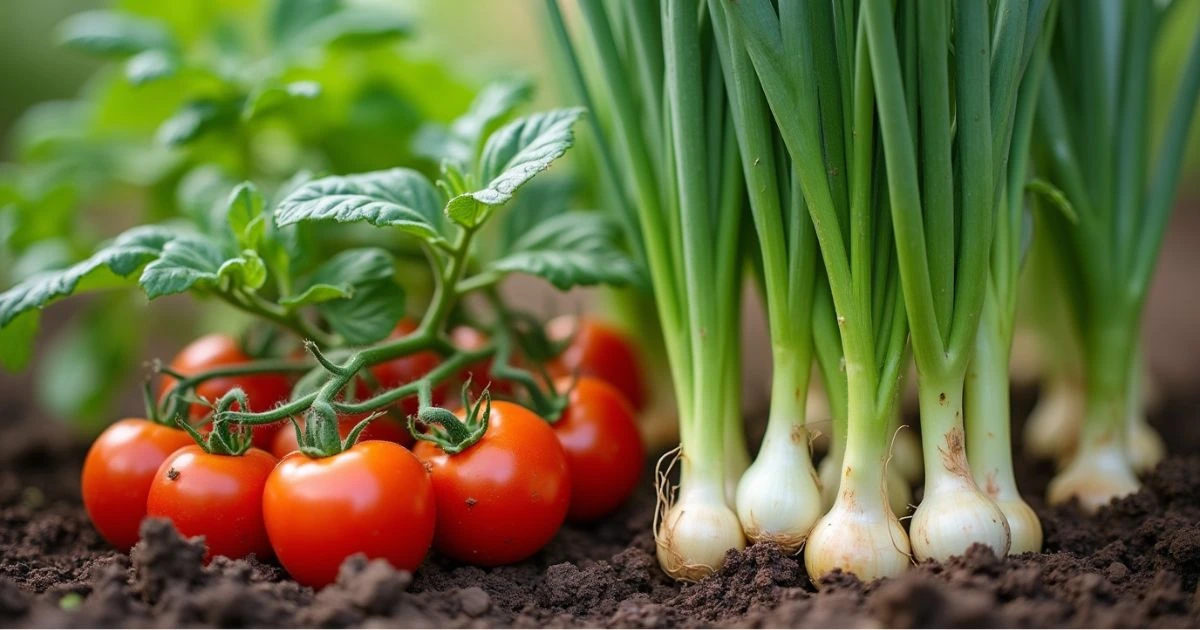
Tomatoes are another fantastic companion for onions. While these two vegetables require careful spacing, their strong aromas deter pests, making them valuable allies in a pest-free garden.
Benefits of Growing Tomatoes with Onions:
- Pest Repellent: Tomato plants deter aphids, a common onion pest.
- Shared Nutrients: Onions and tomatoes don’t compete heavily for soil nutrients, which allows them to grow side-by-side.
- Space Optimization: Tomatoes and onions can be grown in different rows to save garden space while supporting each other.
Planting Instructions: Give onions and tomatoes plenty of room by spacing them at least 12-18 inches apart. This setup allows tomatoes to grow without overshadowing onions.
Gardening Tip: Consider planting basil near tomatoes and onions to create a powerhouse trio. Basil enhances tomato flavor and provides extra pest protection.
7. Strawberries – A Surprising Yet Effective Partner
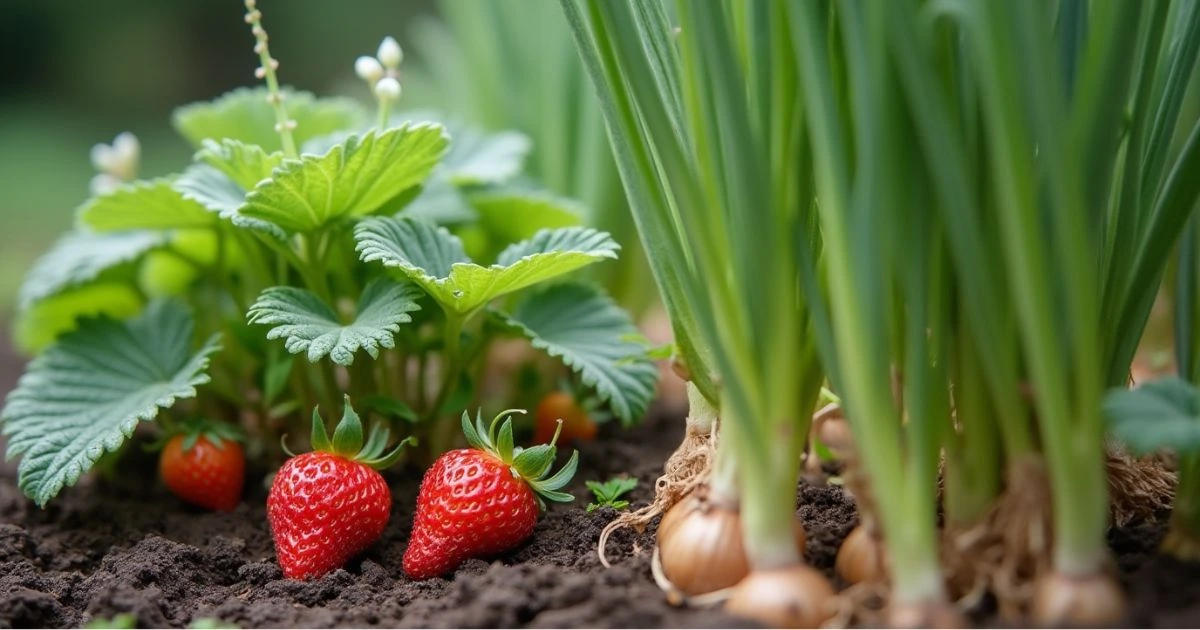
Strawberries might not be an obvious choice as an onion companion plant, but they offer excellent benefits. Onions act as a natural pest barrier, protecting strawberry plants from damage.
Reasons to Pair Onions and Strawberries:
- Pest Repellent Qualities: Onions repel pests that can damage strawberries, helping them grow pest-free.
- Maximizing Garden Space: Strawberries’ low-growing habit works well around taller onion plants.
- Soil Compatibility: Both plants enjoy similar soil conditions, making them compatible garden neighbors.
How to Plant: Arrange onions around the edges of strawberry beds to create a natural pest barrier without taking up too much space. This layout also makes it easier to harvest strawberries without disturbing onions.
Pro Tip: Consider using straw mulch around strawberries and onions. This practice improves soil health, retains moisture, and enhances the garden’s aesthetic appeal.
Best Practices for Companion Planting with Onions
Effective companion planting with onions involves a few essential practices. Following these guidelines can help each plant reach its full potential:
- Proper Spacing: Overcrowded plants can stunt growth, so keep enough space between companions.
- Watering Requirements: Onions prefer moderate watering, so adjust according to their companions.
- Seasonal Rotation: Rotate companion plants each season to prevent soil depletion.
- Use Mulch: Mulch conserves moisture, regulates temperature, and suppresses weeds, making it ideal for companion planting.
These best practices can help you get the most from your onion companion plants, creating a productive and balanced garden environment.
Frequently Asked Questions (FAQ) on Onion Companion Plants
Can onions and garlic be planted together?
While onions and garlic both belong to the Allium family, they compete for the same nutrients, so it’s best to keep them separate.
What should not be planted near onions?
Avoid beans, peas, and asparagus, as onions’ sulfur can interfere with these plants’ growth.
What is the best companion plant for onions?
Carrots are an excellent choice, as they repel onion pests and help aerate the soil.
How close should companion plants be to onions?
Maintain a 4-8 inch gap between onion companion plants to ensure enough space for each to thrive.
Do onions help other plants?
Yes, onions naturally repel pests, making them beneficial for nearby plants like lettuce and strawberries.
Can I plant onions with tomatoes?
Yes, onions and tomatoes grow well together. Onions repel pests like aphids, which can benefit tomato plants. Just space them about 12-18 inches apart for optimal growth.
can you grow onions and garlic together?
It’s best to avoid planting onions and garlic together. Although they are both Alliums, they compete for similar nutrients, which can limit their growth. Planting them separately allows each to thrive.
Grow a Flourishing Garden with Onion Companion Plants
With the right onion companion plants, you can cultivate a garden that thrives naturally. Each companion, from carrots to chamomile, offers unique benefits that improve the garden’s health and productivity. By using these companion planting techniques, you not only boost your garden’s yield but also create a balanced, pest-free space that’s enjoyable to tend.
Experiment with these companions in your garden, and let nature work its magic for a more sustainable, productive growing season. Happy gardening!


